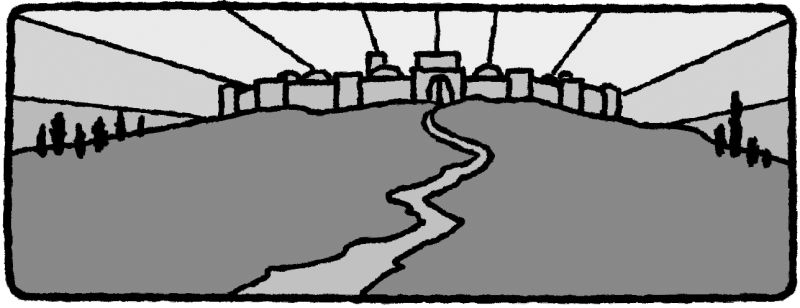Read Psalm 84:1–4. Why does the psalmist long to dwell in the sanctuary?
The psalmist “longs” and “faints” to make the sanctuary his permanent abode so that he can be near God forever (Ps. 84:1, 2). God’s living presence (Ps. 84:2) makes the sanctuary a unique place. In the sanctuary, worshipers can “behold the beauty of the Lord” (Ps. 27:4, NKJV; also, see Ps. 63:2) and be “satisfied with the goodness of [His] house” (Ps. 65:4, NKJV). In Psalm 84, unparalleled happiness is achieved in relationship with God, which consists of praising Him (Ps. 84:4), finding strength in Him (Ps. 84:5), and trusting Him (Ps. 84:12). The sanctuary is the place where such a relationship is nourished through worship and fellowship with fellow believers. The living presence of God in the sanctuary gives the worshipers a glimpse of God’s glorious kingdom and a taste of eternal life.
Read Psalm 84:5–12. Who else can be blessed by the sanctuary?
God’s blessings are described as radiating from the sanctuary, bestowed first on those who serve in the sanctuary (Ps. 84:4), then on the pilgrims on their way to the sanctuary (Ps. 84:5–10), and finally reaching as far as the ends of the earth. The expectation of meeting God in the sanctuary strengthens the faith of the pilgrims (Ps. 84:7). Whereas the strength of the ordinary traveler weakens under the burden of the tiresome journey, with the pilgrims to the sanctuary, their strength increases the nearer they come to the sanctuary.
Even when physically removed from the sanctuary, God’s children continue to bear a stamp of God’s sanctuary by living a worthy life (Ps. 84:11), which characterizes the righteous who enter the Lord’s sanctuary (Ps. 15:1, 2). The Lord is called “a sun,” showing that the blessings from the sanctuary, like the sunrays, extend to the ends of the earth (Ps. 84:11). Thus, those who abide with God through faith receive His grace, regardless of the place where they are.
Read Revelation 21:3. What hope reflected in the earthly sanctuary is revealed here to us? How do we now even begin to imagine what this experience will be like?
Additional Reading: Selected Quotes from Ellen G. White
My soul cries out after the living God. My very being longs after Him. Oh, for to reflect His lovely image perfectly! Oh, for to be wholly consecrated to Him! Oh, how hard it is for dear self to die. We can rejoice in a whole Saviour; one who saves us from all sin. We can be shut in with God where we can daily say, “I live; yet not I, but Christ liveth in me” “to will and to do of his good pleasure.” Glory be to God. I know that my life is hid with Christ in God.
The curtain has been lifted. I have seen the rich reward laid up for the saints. I have had a taste of the joys of the world to come, and it has spoiled this world for me. My affections, my interests, hopes, my all is in heaven. I long to see the King in His beauty, Him whom my soul loveth. Heaven, sweet heaven. “I long to be there; and the thought that ‘tis near, makes me almost impatient for Christ to appear.” Praise the Lord for a good hope through Jesus Christ of immortality and eternal life.—Reflecting Christ, p. 350.
I render thanks unto my heavenly Father for His blessing, after seeking the Lord in prayer. I go to my heavenly Father as a child in need goes to his temporal earthly father. We know that God must be interested in us, as the earthly parent is interested in his child, but to a much larger degree. I place myself as His child, and in simple faith ask for the small favors as I would ask for larger gifts, believing the Lord hears the simple, contrite prayer.
I keep saying in my heart, He loves me, He wants my love, and He wants me to be happy. “No good thing will he withhold from them that walk uprightly.” “For the Lord God is a sun and shield: the Lord will give grace and glory.” “O Lord of hosts, blessed is the man that trusteth in thee” (Psalm 84:11, 12).—That I May Know Him, p. 143.
The work of redemption will [soon] be complete. In the place where sin abounded, God’s grace much more abounds. The earth itself, the very field that Satan claims as his, is to be not only ransomed but exalted. Our little world, under the curse of sin the one dark blot in His glorious creation, will be honored above all other worlds in the universe of God. Here, where the Son of God tabernacled in humanity; where the King of glory lived and suffered and died,—here, when He shall make all things new, the tabernacle of God shall be with men, “and He will dwell with them, and they shall be His people, and God Himself shall be with them, and be their God.” And through endless ages as the redeemed walk in the light of the Lord, they will praise Him for His unspeakable Gift,—Immanuel, “God with us.”—The Desire of Ages, p. 26.

